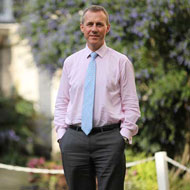Nigel Gibbens joins RUMA scientific group

Professor Gibbens retired from his post as CVO earlier this month, after 10 years in the role.
The UK’s former chief veterinary officer Nigel Gibbens has joined RUMA’s independent scientific group, where he will help to inform policy on the responsible use of medicines in farm animals.
Professor Gibbens retired from his post as CVO earlier this month, after 10 years in the role. He was succeeded by Christine Middlemiss, who was previously CVO for New South Wales, Australia.
RUMA’s independent scientific group comprises eight eminent researchers and scientists from the veterinary, medical and microbiological fields.
Commenting on his decision to join, Professor Gibbens said he has been impressed by the recent progress made by UK livestock sectors in reducing, refining or replacing the use of antimicrobials on farms.
He believes it is time to look at how science can support further efforts to reduce on-farm use.
A strong evidence base for antibiotic use and health and welfare improvements for farmed livestock, should be integral to the aspirations stated within the government’s consultation; ‘Health and Harmony: the future for food, farming and the environment in a Green Brexit’.
“RUMA’s ongoing leadership in AMR mitigation through excellent animal husbandry in all production systems can help to differentiate UK produce and elevate its reputation post Brexit,” he explained.
“But to achieve this, and other goals, we need sound science to underpin all the decisions we make. Sitting on the Independent Scientific Group is a great opportunity to do just that – use the knowledge and insight that I’ve been fortunate to acquire in over 30 years as a Government veterinary officer.”
Professor Gibbens qualified from the RVC in 1981 and worked in general practice before completing a master’s in tropical veterinary medicine at Edinburgh University. He provided government-led veterinary services in Belize and Yemen, then returned to the UK as a government field veterinary officer in 1990, after which followed a series of lead veterinary roles in government.



 The latest
The latest